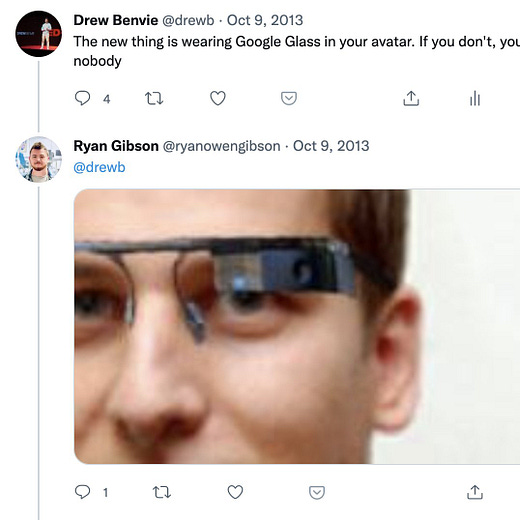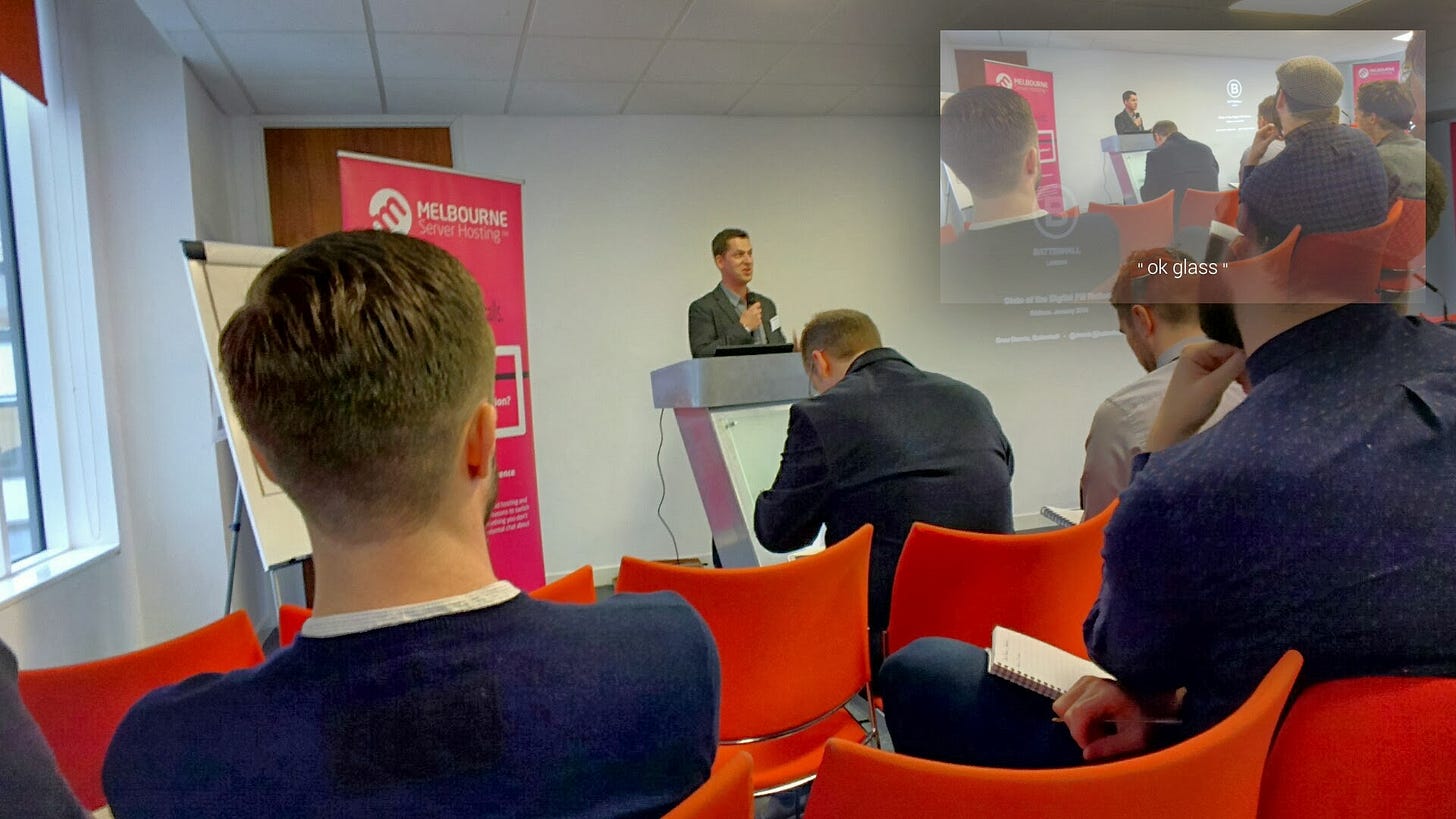The Social Media Report #28: social media sunglasses herald a step toward the metaverse
Facebook launches Ray-Ban Stories
In this edition of The Social Media Report, I’ve donned my Snapchat Spectacles and cast my mind way back to 2013 when eyewear began incorporating cameras that could record your every move, and post it to social media. Now, with the launch of Ray-Ban Stories, I’m wondering, is the timing now right for shades which share to social media, or will it never be?
I also have as usual my must-read articles of the week. Subscribe below if you’ve been sent this, and you’ll get every edition soon as it’s out.
Here come the social media sunglasses: last week saw Ray-Ban and Facebook launch the latest innovation in eyewear - glasses with a in-built cameras that can capture what you’re seeing and send it to your phone and your social network with just the tap of your specs. This is a classic Facebook move, in that it’s nothing new, rather an imitation and slight evolution of something that has already become nearly mainstream.
Facebook putting its muscle into a product like this, and it being co-branded and pushed heavily by a partner in Ray-Ban, will absolutely propel this technology to a new level of public awareness and public acceptance. You will see many people sharing Stories from their sunnies in the not-too-distant future. But does that make this technology any less creepy to be seen to be using?
Imitation is flattery: just like Facebook copied Stories from Snapchat, it’s now doing the same to Snapchat’s Specs, which were themselves an evolution of Google Glass. I beta-tested Google’s version of this technology in 2013, and was an early user of Snapchat Specs four years later. I learnt a ton about how this technology could shape future use of social media, but how consumer-grade surveillance tech worn on your face is generally perceived by others, too.
Early lessons in wearable social media cameras: for a while, when this technology was new, it started emerging in the tech early adopter scene. My colleagues at Battenhall pushed it to its limits: we were sending clients out to events wearing Google Glasses, posting reportage style to social media, we researched the technology’s implications for society such as whether facial recognition or always-on watching was ok, and we noticed a fair amount of casual wearing of the devices as early as 2013/14 too. The below pic from Paul Gailey was posted from Google Glass to Google+, shared on Twitter while I was at an event in Manchester.
But the real world use of this generally started to become considered creepy. Or as tech commentator Kate Bevan put it this week, grim.
What to expect in the coming months: it’s perhaps time that cameras became even more pervasive than they are now, and that real world and social media content become even more entwined. Facebook’s Mark Zuckerberg espouses the metaverse more than anything else at the moment, so is this just the next logical step? More social media in front of your eyes? Zuck says so, that this is not the end game with Ray-Ban Stories, rather a step in the direction of augmented reality.
Weird for now, but so was all social media: take it from someone who has worn glasses like this in public a lot, the reaction you get from someone when you look at them with a secret but pretty obvious camera pointed right at them isn’t pleasant. Until it’s culturally OK to point a camera in someone’s face, Ray-Ban Stories will be seen as weird and will cause discomfort from those around the wearer. But once glasses get way smarter, and the real, digital, virtual and social worlds can become more intertwined, then this will get interesting.
One last observation on virtual worlds: I was in the audience for a live interview on Twitter with artist Beeple, who I wrote about earlier this year after his NFT sold for a record $69m. Beeple says, don’t think too deeply about Facebook / Ray-Ban glasses, we’re already in the metaverse - with our heads in our phones, we’re already in a virtual reality. He even said he sees spending so much time inside Twitter as being in a virtual reality. So maybe we’re deeper into the Matrix than we know.
Until the dystopian future arrives, we will just have another Ray-Ban shaped reason to wonder who’s really watching and how this information is all being used.
My must reads of the week
Here are some of the stories that I have been reading this week.
Platforms
Discord hits eye watering $15bn valuation: time to dive into the audio / chatter / streaming platform after it raised $500m in funding.
Deep dive into Telegram as a dark web: the FT looks at the dark activities taking place on messaging and groups network Telegram. Connected: a network selling fake vaccination cards exposed on Telegram.
Green pages: WhatsApp plans launch of a directory of businesses on the platform.
Snapchat hires first global safety officer: former Microsoft exec Jacqueline Beauchere joins Snap Inc.
Disinformation
A ‘troll farm’ of 15,000 fake Facebook pages from Kosovo and Macedonia has been exposed, which were found to be reaching a weekly audience of 140 million people with disinformation during the last US general election.
How extremists use TikTok to promote violence: US federal officials have explained how domestic extremists had used TikTok in the lead-up to Capitol Hill riots.
How anti-vaxxers used Facebook to undermined healthcare: how ‘a cadre of antivaccine activists flooded the network with what Facebook calls “barrier to vaccination” content.’
Health
Insta boss comes under fire for comparing social media’s safety concerns to car deaths: “…more people die than would otherwise because of car accidents, but by and large, cars create way more value in the world than they destroy, and I think social media is similar.” Ouch.
Instagram’s negative impact on mental health: Facebook data shows a third of teenage girls say that Instagram negatively affects them.
When Facebook staff find bad stuff: the WSJ obtained internal documents that show Facebook's weak response after staff flagged human traffickers and drug cartels.
Policy
Tech industry reacts to new UK DCMS head: Boris Johnson has appointed Nadine Dorries to Secretary of State for Digital, Culture, Media and Sport, and tech pundits have not reacted positively.
A look at how and whether humans should intervene in AI decision-making: ethics in AI is really hot topic, and includes what the social media algorithms show you. Connected: UN calls for changes in AI that affects human rights.
Interviews
SEC chair Gary Gensler interviewed in NY Magazine: the article touches on regulation, crypto currencies and investment.
Platformer interviews WhatsApp’s Will Cathcart: looking into whether content on WhatsApp should be reviewed by WhatsApp moderators.
Live interview with NFT artist Beeple: the wide ranging chat was hosted on Twitter Spaces and now available to listen back. Touches on NFTs, virtual worlds, Twitter communities and future trends in branded digital content.
Updates
I was interviewed for a LinkedIn Live this week on building a business with purpose. The recording is here.
Battenhall has been shortlisted for a consultancy of the year 2021 award by The Drum.
Pics are coming in of our new Los Angeles office and I’m getting fomo from London…
The Social Media Report is written by Drew Benvie, founder & CEO of Battenhall.
You can follow The Social Media Report on Twitter at @TheSMReport. Suggestions for stories can be emailed to db@battenhall.com. Thank you for reading, and see you next time.





